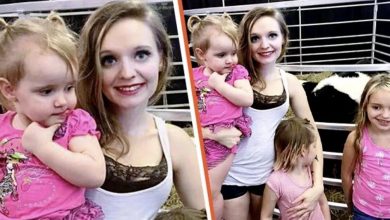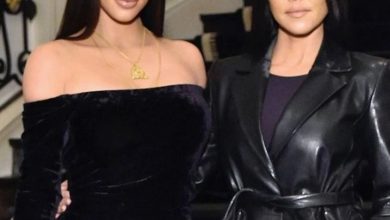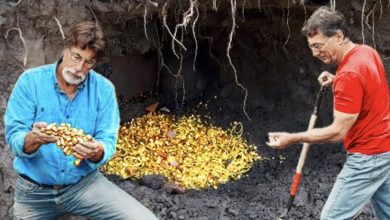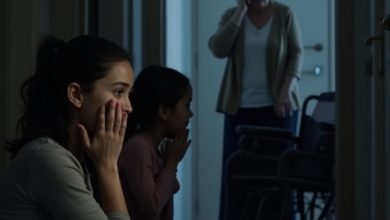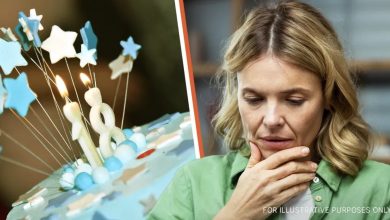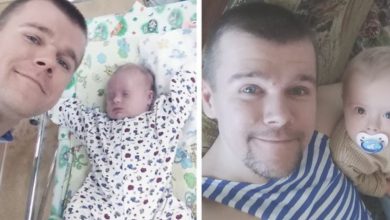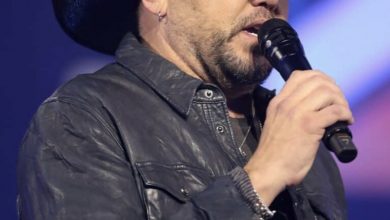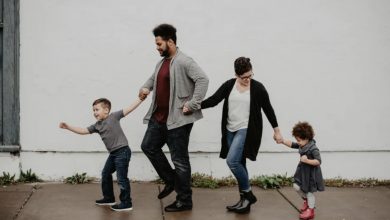“She Saw a Strange Woman’s Coat in Her Home—The Truth That Followed Left Her Stunned”
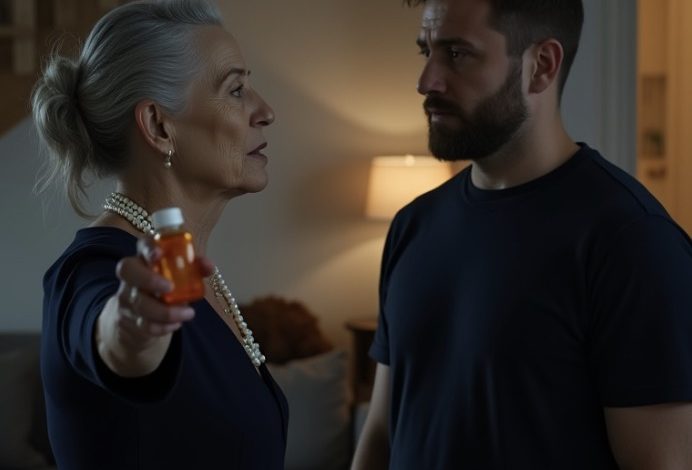
The porcelain cup rattled faintly against its saucer as I set it down, the sound sharp and wrong in my sister’s quiet Iowa kitchen. Outside, the October wind scraped against the windows, carrying leaves across her small yard in restless patterns. But inside, the storm was not the weather—it was the unease growing in me.
“Olivia, you look pale,” Louise said, lowering her pencil and peering over her glasses. At seventy-one, my older sister had lived through enough to see truth where others saw shadows. “What’s stirring you now?”
I pressed my fingers to my temples. “I should check on Jorge. Call him. Something doesn’t sit right.”
Louise’s pencil hovered over her crossword. “You called him yesterday. He’s thirty-eight, Olivia. He can look after your place for a few days without your supervision.”
But that was the problem. Jorge hadn’t just been looking after my house since his divorce two years ago—he had moved back into it. My four-bedroom colonial in Riverside. The house where I had raised him. The house where his father and I had planned to grow old together. The house that was supposed to be my sanctuary, now slowly becoming his claim.
“I know, but I can’t shake the feeling,” I said, fumbling with my phone. “Something was off in our last talk.”
The screen lit up. After a few rings, Jorge’s face appeared. He was in my kitchen—our kitchen—and something about his stance looked strange. As if he were deliberately blocking part of the room.
“Hey, Mom,” he said brightly. Too brightly. “Everything okay?”
“Just checking in. How’s the job search?”
His hand moved through his hair. A childhood habit when he was nervous. “Yeah, some leads. Actually, I was going to call you later. I might—”
“Jorge, tilt the phone a little. The angle’s odd.”
He hesitated. “Like this?”
“Yes, better. Now I can see the back door.”
And I could. My eyes went straight to the hooks where we had hung coats and keys for decades. On mine—a coat I had never seen before.
It was burgundy wool, rich fabric with a silver clasp at the neck. Expensive. Not mine. Not Judy’s, either.
“Whose coat is that, Jorge?”
His face tightened. “What coat?”
“The burgundy one. On my hook.”
“Oh, that. Probably Judy’s. She left some things. I need to return them.”
But Judy had been gone for two years. She wore light colors and flowers, not luxury wool with silver clasps.
“When is she coming for it?” I asked evenly.
“Soon. Maybe next week. Listen, Mom, I need to run. Meeting someone about a job.”
“On a Saturday evening?”
“It’s not a regular nine-to-five. I’ll call you tomorrow.” He hung up before I could protest.
My reflection stared back at me from the black screen.
“There’s a woman’s coat in my kitchen,” I said flatly.
Louise folded her crossword book. “Maybe he’s dating again. That’s not bad, Olivia.”
“He lied,” I whispered. And dread crept cold through me.
“What will you do?” Louise asked gently.
“I’m going home. Tonight.”
“Olivia, it’s an eight-hour drive.”
“I need to know what’s happening under my own roof.”
She searched my face, then nodded. Louise knew me. When doubt turned into resolve, nothing could stop me.
Returning Home
It was after midnight when my car rolled into the driveway. The porch light cast a weak amber glow, stretching shadows across the yard. Jorge’s car wasn’t there.
The key turned smoothly, but the smell inside hit me first. Not the usual lavender from my cleaning sprays, but perfume—floral, expensive, lingering.
I moved quietly, a trespasser in my own home. Two wine glasses sat drying in the rack—my best crystal, not Jorge’s cheap mugs. The burgundy coat was gone, but traces of her lingered.
Upstairs, the guest room where Jorge stayed was neat, but a small velvet jewelry box rested on the dresser. Inside: pearl earrings. Real ones.
The master bedroom—my bedroom—looked disturbed. The comforter was pulled back, the pillows rearranged. Someone had been in my bed.
In the bathroom, I found the final proof. A prescription bottle on the counter. The name: Deborah Ward.
I photographed it with my phone. My hands shook. That’s when I heard the door open downstairs.
“Mom?” Jorge’s voice called, startled, sharp with panic.
I descended slowly. He stood in the hall, looking guilty and unprepared.
“Hi, sweetheart,” I said calmly. “I came home early.”
“You should’ve called. I’d have tidied up.” His words tumbled too fast.
“The house looks fine. Very… lived in.”
His eyes flicked toward the kitchen. “About that job interview—”
“With Ward Consulting?” I asked, watching him flinch at the name.
His silence was telling.
“Jorge, is there something you want to explain?”
“I’m an adult, Mom.”
“You are. But you need to be honest when you’re living in my house.”
“This is my home, too,” he snapped.
The words cut deep. To him, my house wasn’t mine anymore—it was his inheritance. Claimed early.
“Is it temporary, Jorge? Or do you think this is yours now?”
He sagged onto the couch. “I don’t want to fight.”
“Neither do I. But the coat wasn’t Judy’s.”
“No,” he admitted finally.
“Whose was it?”
“A friend’s.”
“What kind of friend leaves jewelry in my bedroom and prescriptions in my bathroom?”
His head jerked up. “You went through my stuff?”
“I went through my house.”
His mask slipped. “Fine. Her name is Deborah Ward. She cares about me.”
“The same name on the bottle? And you’ve let her stay here? In my room?”
His jaw tightened. “This is my childhood home. I have as much right as you.”
“No,” I said softly. “You have as much memory. But not ownership.”
The Truth About Deborah
Morning came with no rest. I sat in my kitchen, staring at the empty hook where the burgundy coat had hung.
By Sunday, Jorge emerged in new clothes—too expensive for a man without a job.
“Morning, Mom,” he muttered, avoiding my gaze.
“Church in an hour,” I said.
“I don’t do church anymore.”
“Well, I do. I still believe in truth and respect.”
At First Presbyterian, familiar faces greeted me. Pastor Leo Barnes delivered the sermon. His wife, elegant in cream with pearl earrings, sat in the front pew.
Her name: Rebel Barnes.
Rebel. Deborah.
The revelation chilled me. Rebel was using her maiden name on prescriptions, hiding an affair with my son.
After service, the pastor approached warmly. “Olivia, Rebel mentioned dinner soon.”
“Yes,” I said evenly. “She’s always been… generous.”
He chuckled. “She keeps the books for us. I trust her completely.”
His words struck like a hammer. Rebel had access to church funds. And suddenly, Jorge’s luxuries made sense.
That afternoon, I called Pastor Barnes. “Could you visit tomorrow? There’s something you need to hear.”
The Confrontation
Monday morning, I faced Jorge.
“Deborah Ward is Rebel Barnes, isn’t she? Our pastor’s wife.”
His face drained of color. “You don’t understand—she loves me.”
“She’s also funding you. With stolen money.”
He paled further.
The doorbell rang. Pastor Barnes.
“You’re not leaving,” I warned Jorge. “If you run to her, you lose me forever.”
He froze.
We sat in the living room. I spoke steadily. “Pastor, Jorge has been involved with your wife.”
The pastor’s face went rigid. “That’s impossible.”
Jorge’s whisper shattered him. “I love her.”
“And she’s been using church funds,” I added.
The pastor’s phone confirmed it—$43,000 missing over months.
We went to the Riverside Inn. Rebel sat at a table with wine and laughter. Her expression crumbled when she saw us.
“Rebel,” Leo said, voice trembling but firm, “did you take from the church?”
Tears fell, but her words burned. “I deserved more after decades of being invisible.”
“How much?” he demanded.
“$43,000,” he confirmed from the records.
She looked at Jorge. “They’ll never understand.”
“I understand betrayal,” Leo said coldly. “Adultery. Theft. All in the name of ‘deserving more.’”
She fled. Jorge tried to follow, but I stopped him.
“Did you love her, Jorge? Or what she gave you?”
His silence was my answer. He walked away.
Aftermath
Pastor Barnes prepared to call the board and police. His world had collapsed, yet he stood tall.
“What about you?” he asked me gently.
“I’ll reclaim my house. Alone, if I must.”
For the first time in years, I felt clear. Strong.
By the river, the October wind cut sharp, but I stood unshaken. Winter was coming—but I would face it as a woman who had rediscovered her strength, her boundaries, and her freedom.
Love without truth, I realized, isn’t love at all. It’s just a prettier form of destruction.
And I was done mistaking one for the other.

